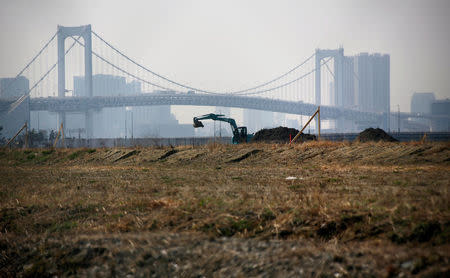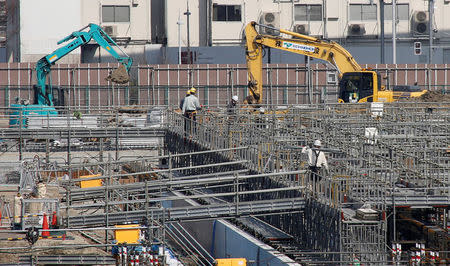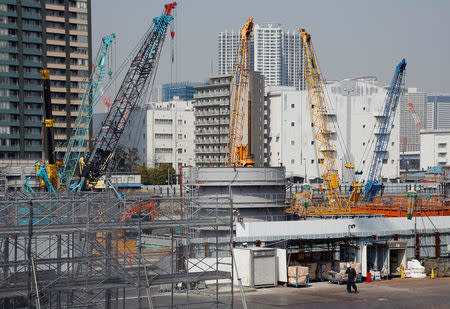Japan core machinery orders rebound, easing capex concerns
By Stanley White
TOKYO (Reuters) - Japan's core machinery orders rebounded in January from a steep decline the previous month, handily beating expectations in a sign that capital spending will continue contributing to economic growth.
The 8.2 percent rise in core orders, a highly volatile data series regarded as an indicator of capital spending in six to nine months, was more than the 5.6 percent increase expected by economists.
In December core orders tumbled a revised 9.3 percent, the fastest fall in more than three years. The Cabinet Office said in a statement on Wednesday that core machinery orders were "recovering".
Japan's economy expanded more than initially estimated in the last quarter of 2017, thanks to an upward revision of capital expenditure and inventory data, confirming the longest run of growth in 28 years.
Rising machinery orders suggest that Japan's recent growth spurt is likely to continue, but uncertainty surrounds the policy outlook because revelations of a cover-up of suspected cronyism is eroding confidence in the prime minister.
"I expect capital expenditure to continue to rise gradually, driven by strength in overseas economies," said Yusuke Ichikawa, senior economist at Mizuho Research Institute.
"The government's problems introduce some uncertainty, but at this stage companies are likely to look beyond the government's problems and focus on growth in overseas markets."
Orders from manufacturers rose 9.9 percent in January, rebounding from an 8.5 percent decline in the previous month.
Non-manufacturers' orders rose 4.4 percent in January, also recovering from a 5.3 percent decline in the previous month.
From a year ago, core orders, which exclude those for ships and from electric power utilities, rose 2.9 percent, more than the median estimate for a 0.6 percent annual increase.
Some opposition lawmakers are calling on Finance Minister Taro Aso and Prime Minister Shinzo Abe to resign after Aso admitted that finance ministry employees altered documents related to the sale of government land.
Critics say a person with ties to the prime minister's wife used this relationship to buy the land on the cheap. Abe has repeatedly denied that he or his wife were involved.
Another risk to the outlook is the chance of a trade war after U.S. President Donald Trump decided to slap tariffs on imported steel and aluminium. Japan has requested an exemption, but it is unclear whether the U.S. government will grant one.
Despite these risks, economists said the capacity constraints in Japan's economy mean companies will inevitably increase investment.
"The bigger picture is that firms are facing the most severe capacity and staff shortages since the early 1990s which suggests that capital spending will continue to expand at a solid pace this year," Marcel Thieliant, senior Japan economist at Capital Economics, said in a note.
(Reporting by Stanley White; Editing by Eric Meijer)

 Yahoo Finance
Yahoo Finance 













